RECHERCHE DE L’INDUSTRIE
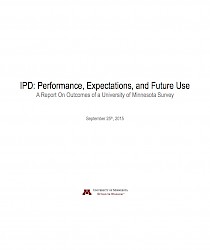
IPD: Performance, Expectations, and Future Use (disponible en anglais seulement)
La réalisation efficace du projet répond ou dépasse les attentes du propriétaire en matière d’échéancier, de coût et de qualité. Il existe un ensemble émergent de recherches qui démontrent qu’une prestation plus collaborative/intégrée est plus susceptible de mener à des résultats positifs et à un rendement d’équipe de haut niveau. Dans ce contexte, cette enquête prend un aperçu des perceptions actuelles de l’efficacité des projets utilisant des accords multipartites, les plus formels et les plus contraignants sur le plan contractuel des méthodes de prestation intégrées.
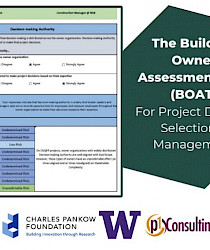
BUILDING OWNER ASSESSMENT TOOL (BOAT) - FOR PROJECT DELIVERY, SELECTION & MANAGEMENT
The Integrated Project Delivery Alliance (IPDA) in partnership with the Charles Pankow Foundation (CPF), the University of Washington College of Built Environments, The American Institute of Architects (AIA), P1 Consulting, and Chandos Construction is pleased to announce a new tool, the Building Owner Assessment Tool (BOAT): Helping You Understand Your Culture and Its Project Delivery Ramifications and is now available for free download and usage.
Visit the Charles Pankow Foundation website https://lnkd.in/gB8pcSr4 for additional information and to download the BOAT tool.
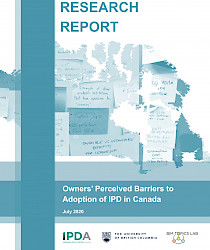
Owners' Perceived Barriers to Adoption of IPD in Canada (disponible en anglais seulement)
Bien que la RPI "IPD" soit en train de devenir un modèle de prestation viable dans l’industrie, avec des réussites au Canada et dans le monde entier, certains propriétaires canadiens hésitent à l’essayer. Cette étude présente les résultats d’une recherche portant sur les obstacles perçus par ces propriétaires à l’adoption de la RPI "IPD" comme modèle de réalisation de leurs projets de construction. Les raisons sont complexes, mais peuvent en grande partie être résumées à un ensemble de six obstacles perçus et explorés en détail dans le présent rapport.
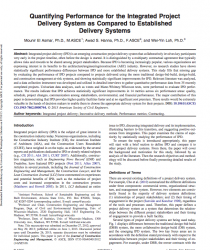
Parce que la RPI "IPD" devient de plus en plus populaire, diverses organisations expriment leur intérêt pour ses avantages pour l’industrie de l’architecture / ingénierie / construction (AEC). Cette étude comble cette lacune en évaluant le rendement des projets de RPI "IPD" par rapport aux projets réalisés à l’aide des systèmes à risque plus traditionnels de conception-soumission-construction, de conception-construction et de gestion de la construction, et en montrant des améliorations statistiquement significatives pour les projets RPI "IPD".
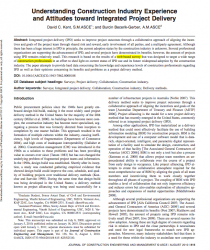
Parce que la RPI "IPD" devient de plus en plus populaire, diverses organisations expriment leur intérêt pour ses avantages pour l’industrie de l’architecture / ingénierie / construction (AEC). Cette étude comble cette lacune en évaluant le rendement des projets de RPI "IPD" par rapport aux projets réalisés à l’aide des systèmes à risque plus traditionnels de conception-soumission-construction, de conception-construction et de gestion de la construction, et en montrant des améliorations statistiquement significatives pour les projets RPI "IPD".